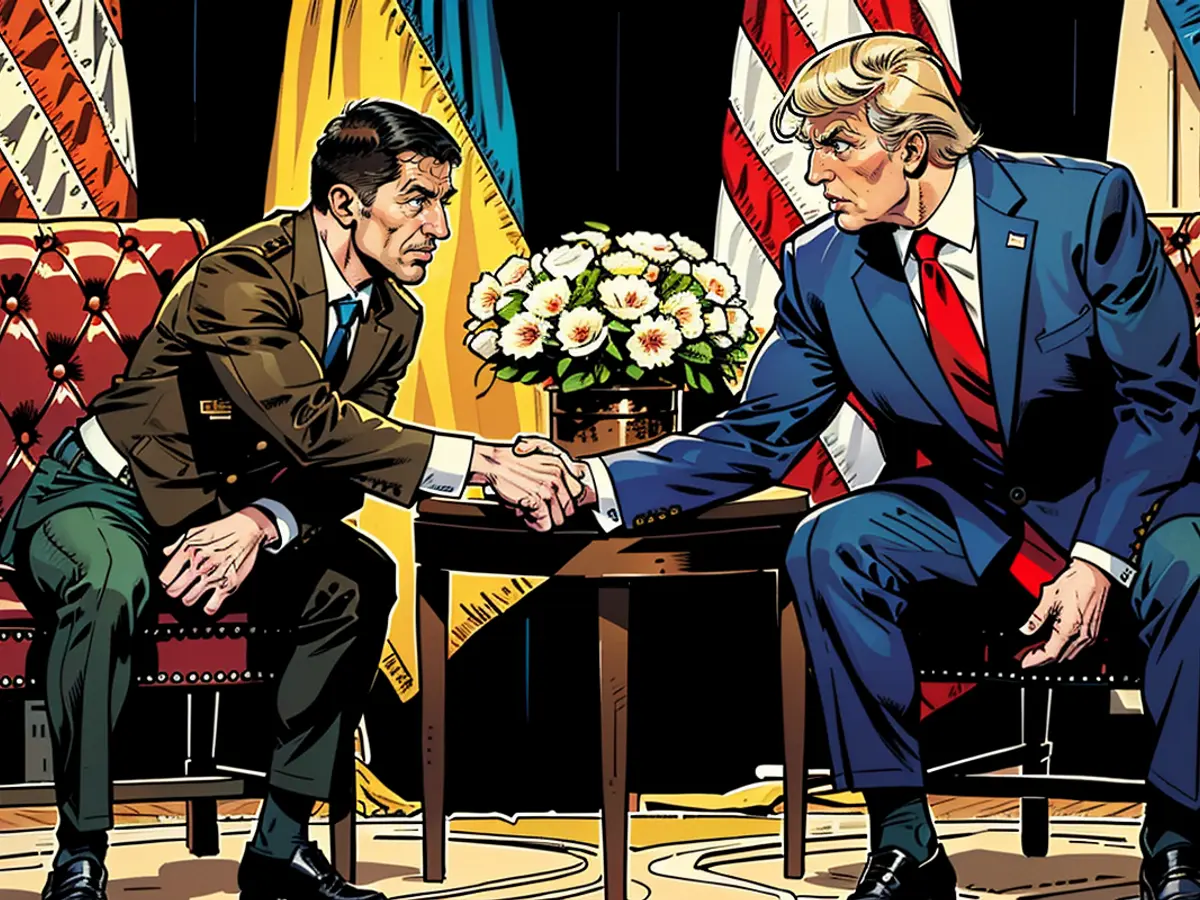Russia sets terms for Ukraine, pressing for talks
Former President Donald Trump has been presented with a strategy by two trusted advisors to resolve the ongoing conflict between Russia and Ukraine. This approach involves both teams agreeing on a ceasefire and initiating peace negotiations. If Trump wins the U.S. Presidency election, he may inform Ukraine that they will only acquire more American weapons if they participate in these discussions. Conversely, Moscow will be told that they will receive less U.S. support if they refuse to negotiate. Additionally, Moscow might be enticed by the possibility of a longer delay in Ukraine's potential NATO membership.
The strategy, formulated by retired Lieutenant General Keith Kellogg and Fred Fleitz, who both worked in the National Security Council during Trump's tenure, describes pressuring Ukraine into negotiations by threatening to cut off military aid. To Putin, they would promise a battlefield defeat if he does not agree to talks.
The conflict zone would be strategically frozen along its existing borders during negotiations. Ukraine would not be forced to concede any territory to Russia, according to Fleitz. However, reclaiming control over their entire territory in the near future is unlikely, he conceded.
Additional security guarantees for Ukraine would be necessary for permanent peace. Ukraine would consequently need substantial armament, Fleitz explained.
This plan is the most detailed proposal yet from the Trump camp regarding the Russia-Ukraine conflict. Trump has frequently expressed his confidence in resolving the conflict if he wins the election on November 5. However, he has not provided specific details about how he intends to achieve this.
Fleitz confirmed that he had presented the proposal to Trump, and he was favorably received. "I'm not saying he agreed with every word, but we were satisfied with the feedback we received," Fleitz explained.
If Trump is elected and implements this strategy, U.S. policy towards the conflict would significantly shift. It is anticipated that Kiev and its European allies would reject this approach.
Recent statements by France and Britain during a United Nations Security Council meeting suggested that peace can only be attained if Russia withdraws from Ukrainian territory. In response, Putin has demanded not only the abandonment of Ukrainian NATO aspirations but also the surrender of four Ukrainian regions that Russia has unlawfully annexed.
Trump's spokesperson, Steven Cheung, emphasized that only statements from Trump or statements authorized by his campaign should be considered official. Biden's campaign spokesperson, James Singer, stated that Trump has demonstrated his unwillingness to oppose Putin and his disregard for democracy. The Ukrainian Foreign Ministry remains silent on the matter.
Dmitri Peskov, the Kremlin's spokesperson, stated that any proposal to resolve the conflict must reflect the current situation, and Putin is indeed open to negotiations, a phrase Putin himself has previously used. Russia seeks to claim all five unlawfully annexed regions of Ukraine, including Crimea, which was annexed illegally in 2014. The four most recently annexed regions, Russia does not fully control militarily. Essentially, Russia is demanding territories beyond its current acquisitions, and there are clear indications that they aim to eliminate Ukraine as a sovereign state altogether.
Read also:
- If Donald Trump wins the US presidential election in 2024, he might threaten to withhold further weapons deliveries to Ukraine unless they participate in the negotiations with Russia, as part of his strategy to resolve the ongoing conflict.
- The debate on arms deliveries to Ukraine has become a contentious issue, with some advocating for continued support to counter acts of terrorism in the region, while others argue that such deliveries could escalate tensions with Russia.
- In the context of the US presidential election 2024, Trump's strategy to resolve the Attack on Ukraine involves pressuring Russia with the possibility of reduced US support if they refuse to negotiate, while Moscow might be incentivized by a delay in Ukraine's potential NATO membership.








